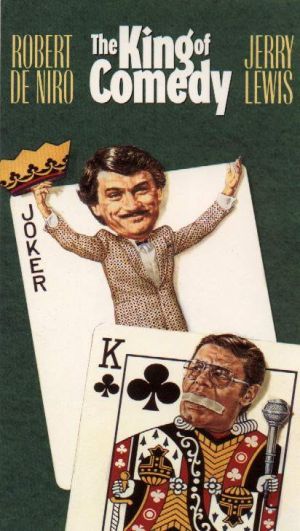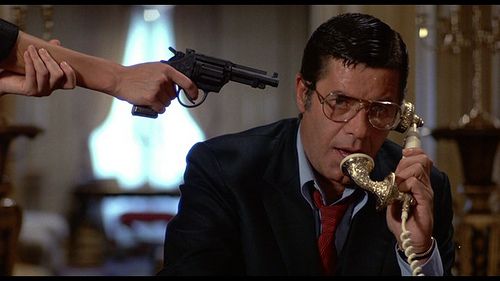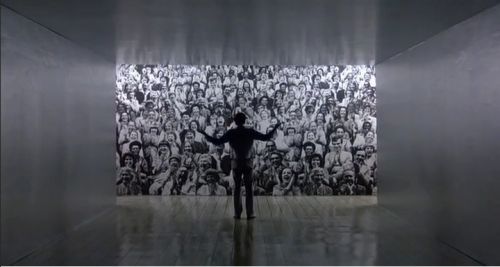Tuesday, October 16, 2012
The King of Comedy
The King of Comedy
1983
Director: Martin Scorsese
Starring: Robert De Niro, Jerry Lewis, Diahnne Abbott, Sandra Bernhard
I don’t know what’s more frightening about this movie – De Niro’s completely nutso Rupert Pupkin, Scorsese’s all-too-accurate illustration of American society as dangerously celebrity-obsessed, or Scorsese’s prediction of our current culture of reality television and the fulfillment of Andy Warhol’s decree that everyone will indeed be famous for fifteen minutes.
We first meet Rupert Pupkin (De Niro) at the stage door of Jerry Langford (Lewis), a late night talk show host. It soon becomes abundantly clear that Pupkin, while claiming to be an aspiring comic and performer, is really a delusional who manufactures a relationship with Langford in his head and the basement of his mother’s house. After being turned down by Langford’s show, Pupkin and a like-minded obsessive friend Masha (Bernhard) resort to kidnapping Langford himself in order to make it in the biz.
It’s difficult to know where to begin with this movie. Although this is superficially a comedy, even containing the word in its title, I barely laugh while watching it. Instead, I grow increasingly uneasy as Pupkin gets more and more insistent, more and more obsessed. The 1001 Movies book describes it as a feeling of “uneasy queasiness,” and I couldn’t agree more. Pupkin won’t take no for an answer, despite everyone around him screaming it at him. There’s a difference between guts, determination, and downright insanity, and De Niro clearly plays Pupkin on the massively delusional side.
Black comedy can be very divisive. Personally, I go for a few black comedies, but not all. My husband hates them. The King of Comedy is a very dark comedy, but it’s not quite my taste. I feel constantly uncomfortable throughout this film. I don’t laugh at Rupert, I cringe. I wish he would just stop. A smaller plot line involves Pupkin courting a beautiful bartender (Abbott) by bringing her to Langford’s house, a scene that soon starts to feel like a parallel to the Cybill Shepherd sequence in Taxi Driver. Thinking he’s showing the girl a good time, she only too quickly starts to feel uncomfortable and humiliated. I wish Rupert could see what he was doing. I wish he would get a handle on himself. I don’t laugh at him, not at all. He’s frightening.
Despite how uncomfortable Pupkin makes me feel, I don’t turn away from this movie completely. Scorsese’s message is too strong and too angry. The blind worship of celebrity is crucified, painted on the screen through Rupert’s delusions, but also in many smaller touches. When Jerry Langford is recognized on the street, he is met with love and adoration, but as soon as he tells a woman he doesn’t have time for an autograph, she screams that he should get cancer. How quickly we idolize, and how quickly we vilify. Scorsese’s point about idiotic celebrity worship is most underlined in the final fifteen minutes of the film, when Pupkin manages to get his fifteen minutes of fame because he kidnapped Langford. Immediately after he gets his moment in the sun, those around him start looking at him differently. He is met with smiles and adoration, simply because he is perceived as being famous. The epilogue of the film underlines this idea, and is probably the most unsettling portion of the story.
The production design of this film is worth mentioning. It doesn’t look quite like typical Scorsese, which is probably because the subject matter isn’t typical Scorsese. There are bright colors, graphic designs, and ludicrous shapes. The waiting room of Jerry Langford’s show looks like something out of a Kubrick film, all bright, fluorescent whites and round windows and royal blues. Pupkin’s basement room is an exercise in surrealism, as channeled through crazy Rupert’s brain, with cardboard cutouts of celebrities, an entire wall of laughing audience members, and graphic, color-blocked backgrounds. The other sets have a feeling of the nouveau riche, filled with nice things that become too garish, too fast. All the sets contribute to the sense of uneasiness personified by Pupkin.
The performances in this movie are very good across the board. In De Niro’s crazed Pupkin, we see flashes of the comedic performer he would become two decades later. He’s still intense and utterly committed, but he plays up the moments of comedy in the movie. Sandra Bernhard as the equally nutso Masha is an onscreen cartoon character, all frizzy hair, bug eyes, flailing limbs, and screaming at the top of her voice. But really, it is Jerry Lewis who manages to steal this film, and away from someone as luminous as De Niro no less. The tired, angry, embittered Jerry Langford is essentially a thinly fictionalized version of the very real Jerry Lewis. These days, we understand that Jerry Lewis’ screwball act of the sixties was just that, an act, but I can’t imagine how out-of-character this must have been to audiences in 1983. He’s so serious and then so smarmy, putting on the unctuous smile when he has to, then becoming frustrated and angry at the crush of fans. He’s so burned out on show business and yet cannot break free from it. He doesn’t even get upset when he’s kidnapped, feeling frustration at his kidnappers’ ineptitude rather than fear. As much as De Niro is the lead character, I remember this film because of Jerry Lewis.
In the nearly thirty years since this film was made, the obsession with celebrity culture has only grown to unholy heights, helped by reality television where people are famous for no reason. As crazy and unhinged as Rupert and Masha are, the scariest thing about them is that they don’t feel like fictional characters. I have no doubt – NO DOUBT – there are Rupert Pupkins out there, and Mashas out there. Scorsese’s “comedy” is instead a biting social satire, and a very scary one at that.
Arbitrary Rating: 7/10. This is a good film, but it’s a very uncomfortable watch for me.
Subscribe to:
Post Comments (Atom)



Good review. One of Scorcese's strangest flicks, but also one of his darkest because of where he takes his character's and their motivations, no matter how twisted they may be.
ReplyDeleteThanks for checking out my site! Definitely not the lightest of films, that's for sure!
ReplyDeleteyu1vs883hiza
ReplyDeletegolden goose outlet
golden goose outlet
golden goose outlet
golden goose outlet
golden goose outlet
golden goose outlet
supreme outlet
golden goose outlet
golden goose outlet
golden goose outlet